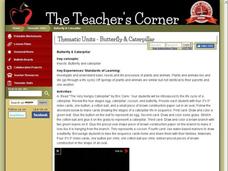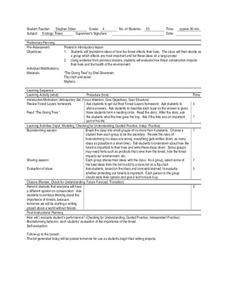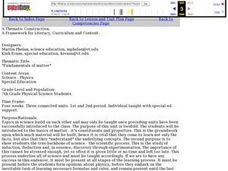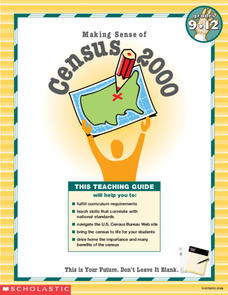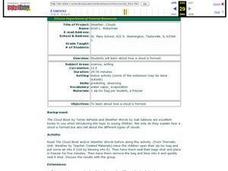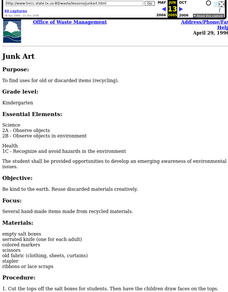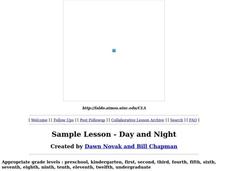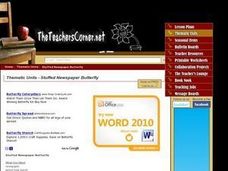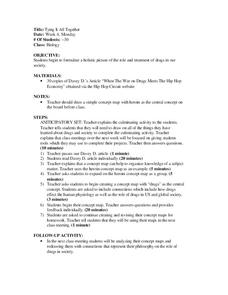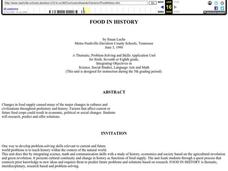Curated OER
Butterfly and Caterpillar
Learners listen to the story "The Very Hungry Caterpillar" and create their own "Very Hungry Caterpillar" book to learn the life cycle of a butterfly.
Alabama Learning Exchange
Introduction to Noctural Animals
Young scholars define noctural and are introduced to a variety of noctural animals. They navigate web sites in order to research noctural animals and write about and illustrate one noctural animal. They create a chart to represent the...
Curated OER
The Moon
Learners explore the relationship between the earth, sun, and moon in our solar system. They create a moonrise/moonset chart, perform a dance that models the moon phases, and create a Styrofoam model of the moon's surface.
Curated OER
Cocaine in the Brain
Students examine the effects of cocaine and heroin and withdrawal symptoms. In this drug lesson students participate in an activity that illustrates cocaine's actions.
Curated OER
B Is For Beaver
In this printing practice worksheet, learners trace 4 dotted examples of Zaner-Bloser upper and lower case letter B. Students practice writing the word "beaver" on the lines provided.
Curated OER
Ecology: Trees
Fourth graders read the defintions of renewale and nonrenewable resources and discuss any incorrect responses. They view a sample of work for the class to see which they describe posting responses on the board in their respective columns...
Curated OER
Ecology: Trees
Fourth graders research and identify the different layers of the forest. As a class, they observe real-life trees or analyze a poster, and discuss the characteristics of each forest layer. Students then draw a forest and label the...
Curated OER
Forests
Fourth graders examine the impact forests have on our lives. They listen to the book "The Giving Tree" by Shel Silverstein, and brainstorm about how forests are important to us. In small groups they create a poster illustrating how the...
Curated OER
Desert Animals
First graders investigate and identify a variety of animals that live in the desert. They complete a class KWL chart, then listen to the book Way Out in the Desert. Next, 1st graders observe a presentation of live desert animals, and...
Curated OER
George Washington and the Rule of Law
students compare The rule of law with the rule of men and consider life under each of these types of governments.In this government lesson, students read a primary source to examine the importance of the rule of law.They will also answer...
Curated OER
Theme: Dinosaurs
Students identify at least ten different dinosaurs and name them. Students explain the difference between plant-eating dinosaurs and meat-eating dinosaurs. Students explain how scientists know about dinosaurs.
Curated OER
Fundamentals of Matter
Seventh graders explore the the constituents and properties of matter. They use the scientific process while exploring solids, liquids, gases, the mass, volume and density of matter. Students plan and conduct an investigation to measure...
Curated OER
Making Sense of the Census
For this unit of lessons, students make sense of the census. They examine why a census is taken and partipate in activities.
Curated OER
Focusing Event to Electricity
Students explain how electrical charges behave. In this electricity lesson, students determine how far away lightning is when it strikes. They research how fabric softener reduces static electricity and share their findings in class.
Curated OER
Weather: Clouds
First graders discover how clouds are formed and how they affect weather. After being read a book, they place air into a Ziploc bag and place it in the freezer. They discuss the results and take a walk outside to observe real clouds.
Curated OER
Eggs
Students know the following parts of an egg as the yolk, white, shell, membrane, chalaza, and air sac. They also sequence the growth of the chick in the egg. An egg is broken and students touch, smell and see it. They locate the six...
Curated OER
Day and Night
Learners discuss why day and night occur after visualizing a teacher-led demonstration.
Curated OER
Theme: Rain Forests and Planet Ecology
Students expand their knowledge of rain forests and planet ecology through the use of literature and related activities.
Curated OER
Stuffed Newspaper Butterfly
Students examine the parts of a butterfly. They use newspaper to build a replica of a butterfly. Students stuff the butterfly and paint it. They display the finished product.
Curated OER
Alcohol, Nicotine or Caffeine Rap
Young scholars create a rap/skit showing the effect of alcohol, nicotine or caffeine. In this biology lesson, students identify the important points of their chosen drug. They present their rap/skit in class.
Curated OER
Addiction As A Disease
Students study drug addiction and its problem in society. In this addiction lesson students answer questions and complete an activity.
Curated OER
Tying it all Together
Students study an article on drugs in their society. For this investigative lesson students create their own concept map.
Curated OER
Food in History
Students research, predict and offer solutions regarding factors that affect current or future food crops could result in economic, political or social changes.


